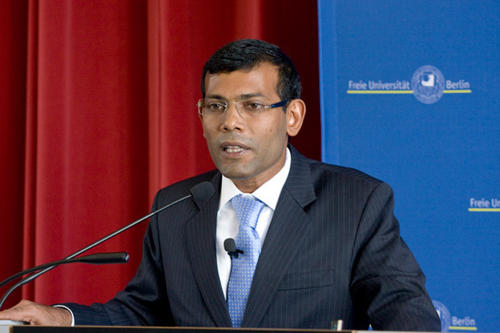“I don’t intend for my children to grow up in a refugee camp.”
Mohamed Nasheed, President of the island nation of the Maldives, which is threatened by rising sea levels, visited Freie Universität Berlin.
Mar 22, 2010
Mohamed Nasheed, President of the Maldives, wishes to initiate radical change in climate policy.
Image Credit: Stephan Töpper
Mohamed Nasheed has made headlines. Several months ago, the Maldivian President and his ministers truly “went under” – to participate in the world’s first cabinet session held on the sea floor. Dressed in diving suits, the members of the government signed an appeal to the international community to further reduce CO2 emissions. This is especially important to the Maldives, located in the Indian Ocean because the island nation is the lowest-lying country in the world. Rising sea levels threaten to obliterate the country entirely. During his visit to Freie Universität, the President of the island nation gave a presentation on Thursday entitled “The Maldives: Leading the Fight Against Climate Change,” in which he made an urgent appeal to the world to seize the opportunity to make a radical change in its climate policies.
Mohamed Nasheed has fought many battles in his life. During the 30-year authoritarian regime of the former Maldivian President Maumoon Abdul Gayoom, Nasheed was persecuted as a member of the opposition, repeatedly imprisoned, and finally forced to flee the country. But he returned to his homeland to become, in 2008, his country’s first democratically elected President in a surprise outcome to the election. But Nasheed has not yet won his biggest and most important fight.
“A Diabolic Plan”
“We’re out of time. We are talking about our very existence because climate change is real,” the Maldivian President told an audience of more than 200 guests at the Henry Ford Building at Freie Universität in his presentation “The Maldives: Leading the Fight Against Climate Change.” There is no reason for doubt, he said. The hacker attack on the Intergovernmental Panel on Climate Change, which led to the public disclosure at the end of last year of thousands of internal e-mails from the climate researchers amid public accusations of a data cover-up, leads the Maldivian President to ask more than just critical questions: “Who put these e-mails into circulation? Who has an interest in making people believe that global warming is a fiction?” This, he said, was a diabolic plan.
The Biggest Industrial Revolution of All Time
At present, said the President of the island nation with a population of about 300,000, the responsible parties are more concerned with the process of climate negotiations than with climate change: “But we have to find a solution instead of talking about it endlessly. You can’t negotiate with Mother Nature.” The lowest common denominator, he went on, will not be enough to save the Maldives, and ultimately the whole world. There would be no reaction at the political level until the topic of climate change became an election issue and people took to the streets, Nasheed said, while exhorting students as well to show greater courage on this issue.
At the same time, the head of state appealed to the world community to “initiate the biggest industrial revolution of all time.” The island nation itself has already embarked on efforts to achieve the big goal of climate protection. “In about ten years, the Maldives will be carbon neutral,” Nasheed said. While that will have a vanishingly small impact on the overall carbon balance for the entire planet, it could serve as an example to other countries. “But what happens to us today; happens to you tomorrow. We are all in this together. In a sense, we are all Maldivians now.”
Maldivians Do Not Want to Leave Their Islands
There is not much time left to take action, Nasheed warned: “We have about ten to twelve years to save our country.” Examples include artificially expanding the Maldives or building artificial reefs. For many Maldivians, the small islands have been their home for countless generations. For that reason, Nasheed pledged to do everything possible to save his country: “I don’t intend for my children to grow up in a refugee camp.”
When one student asked how the conflict between the Maldives’ dependence on the tourism sector and the climate-damaging long-distance flights that entails can be cleared up, the President answered: “It’s a contradiction because we need the money. For that reason, we need to find alternative methods of travel, for instance, and invest more money in new technologies.”
The Maldivian President had been welcomed to the venue by Dr. Dorothea Rüland, director of the Center for International Cooperation (CIC) at Freie Universität. She thanked Nasheed for his visit: “Freie Universität feels very honored.” Dr. Kirsten Jörgensen welcomed him on behalf of the Environmental Policy Research Center, where researchers at Freie Universität carry out numerous projects on topics in the areas of climate research and feasibility.
Further Information
Environmental Policy Research Centre, Freie Universität Berlin
Tel.: +49 (0)30 / 838-55097
Email: kirstenj@zedat.fu-berlin.de

